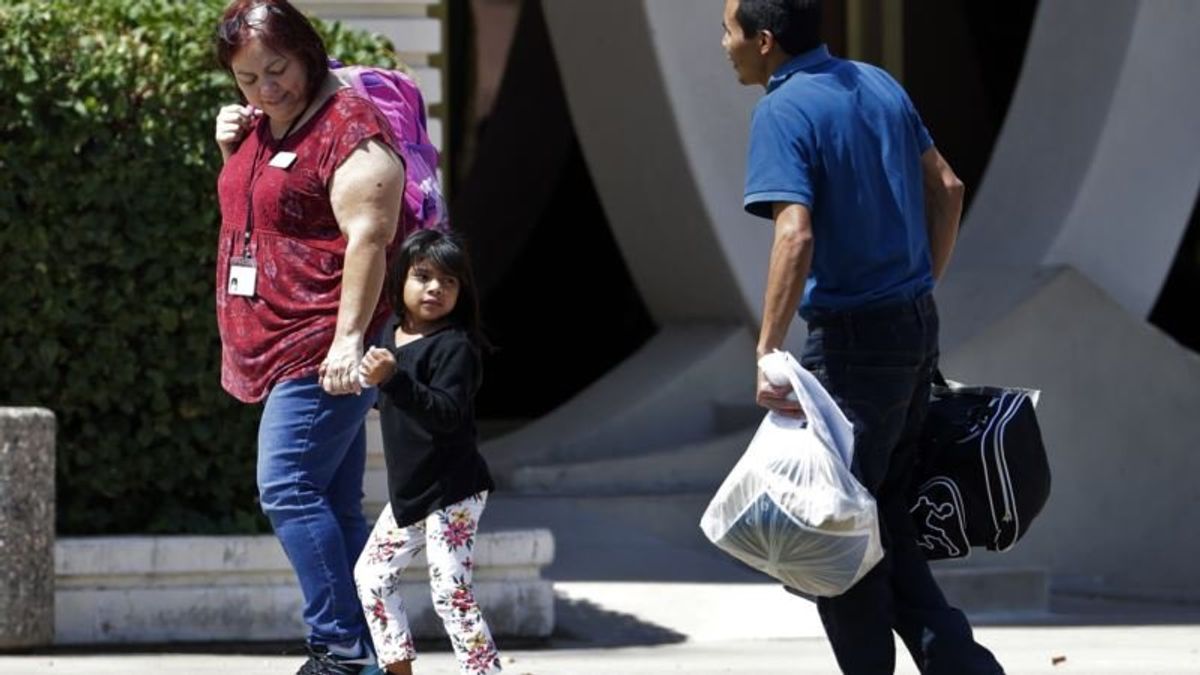
US: 1,400 Immigrant Kids Reunited With Parents
US: 1,400 Immigrant Kids Reunited With Parents

More than 1,400 children out of over 2,500 separated at the U.S.-Mexican border as a consequence of the Trump administration's "zero tolerance" policy on illegal immigration have been reunited with their parents, the U.S.
government said in a court filing on Thursday.
Government lawyers said 711 other children were not eligible for reunification with their parents by Thursday's deadline set by a federal judge in San Diego. In more than 400 of these cases, it was because the parents were no longer in the United States.
The American Civil Liberties Union, which brought the case against the government, said the data showed "dozens of separated children still have not been matched to a parent."
Immigration advocates said the government's push to meet the court's deadline to reunite families was marred by confusion, and one said children had disappeared into a "black hole."
Maria Odom, vice president of legal services for Kids in Need of Defense, said two children who were represented by the group were sent from New York to Texas to be reunited with their mother. When they arrived, they learned their mother had already been deported, Odom told reporters during a conference call.
Children not located
Odom said her group cannot find the children, aged 9 and 14. It was an example, she said, "of how impossible it is to track these children once they are placed in the black hole of reunification."
The U.S. Department of Homeland Security did not immediately respond to a request for comment.
The Trump administration's "zero tolerance" policy toward illegal immigration led to the separation of about 2,500 children while their parents, some asylum seekers, went through a legal process.

An outcry at home and abroad forced U.S. President Donald Trump to order a halt to the separations in June. U.S. Judge Dana Sabraw in San Diego ordered the government to reunite the families and set Thursday as the deadline.
Sabraw has criticized some aspects of the process, but in recent days, he has praised government efforts. As of Monday, 900 people had received final orders of removal, and civil rights groups said they must decide if they want to return home as a family or leave their child in the United States to fight
for asylum separately.
Government lawyers told a federal judge this week that 917 parents may not be eligible for prompt reunification because they have already been deported, have waived reunification, have criminal backgrounds, or are otherwise deemed unfit. The group included 463 the government said are no longer in the United States.
Possible coercion
Rights activists said some may have been coerced or misled into returning home, believing it was the only way to see their child. Government officials have said everyone in an immigration detention center has been given notice of their rights and contact information for a lawyer.
One immigrant, Douglas Almendarez, told Reuters he believed that returning to Honduras was the only way to be reunited with his 11-year-old son.
"They told me: 'He's ahead of you,' " said Almendarez, 37, in the overgrown backyard of his modest soda shop several hours' drive from the Honduran capital of Tegucigalpa. "It was a lie."
As he has previously stated during his time in office, U.S. Attorney General Jeff Sessions on Thursday said voters backed Trump, who made his hard-line immigration stance a keystone of his 2016 election campaign.
"We have a very generous legal immigration system," Sessions said at a news conference in Boston. "But the illegality must end. That's what the American people want."
Sessions was announcing charges against 25 people involved in benefits and document fraud, including 21 who were in the country illegally.

Around the United States, pro-immigration activists protested Trump's policy, including about 100 people in McAllen, Texas, near the Mexican border.
The American Civil Liberties Union has asked the judge to suspend the deportation of reunited families for seven days to ensure that parents understand their rights and have considered their options.
If parents were coerced into leaving the country, Sabraw could order they be returned to the United States to be reunited with their child, ACLU attorney Lee Gelernt told reporters on a conference call.
 Emails: Lawyer Who Met Trump Jr. Tied to Russian OfficialsNext PostDemocrat Senator Confirms Russia Tried to Hack Computers
Emails: Lawyer Who Met Trump Jr. Tied to Russian OfficialsNext PostDemocrat Senator Confirms Russia Tried to Hack Computers







